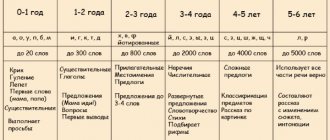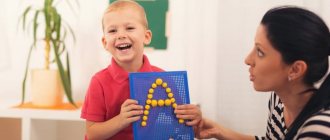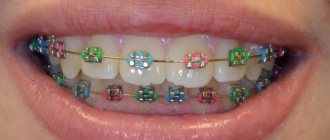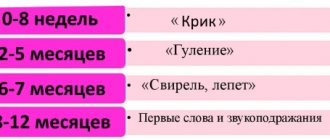Phonetic-phonemic underdevelopment of speech is characterized by a delay in speech development, primarily expressive speech. This condition is often associated with underdevelopment of the cortical parts of the brain, which take on a mature “look” as the baby grows older. If a child’s problems persist after three years, he may be diagnosed with “speech development delay” (SDD). In this case, active speech therapy work begins, aimed at correcting the disorders. Additionally, drugs for speech development can be used: nootropics and drugs that improve the condition of nerve cells.
Information about the disease
The child’s speech development goes through a number of successive stages, which are closely monitored by the pediatrician and parents. As you grow older, you observe a gradual enrichment of your vocabulary, the formation of correct pronunciation and understanding of what others say. It is believed that a child’s speech development continues actively until the age of 3. During this time period, the child enters kindergarten, where he begins to actively communicate with peers and teachers.
At the age of 3 years and older, a diagnosis of speech delay may be made. Doctors believe that this pathology is manifested by a simultaneous violation of all parts of speech: grammar, phonetics and vocabulary. As a rule, suspicions about the presence of a disorder arise earlier, but RDD is diagnosed only after reaching the age of three. Until this time, a speech therapist actively works with the child, which in most children leads to the formation of normal speech.
In the absence of correction, mental retardation can cause the development of dysgraphia and dyslexia, characterized by impairments in writing and reading, respectively. This, in turn, negatively affects the child’s memory, attention, as well as the learning process in kindergarten and school.
Delayed speech development is a consequence of a functional disorder in the maturation of the cortical parts of the brain and the articulatory apparatus. In this regard, therapy for such a condition is always carried out jointly by a pediatrician and a speech therapist using medications, speech therapy exercises and other methods.
Necessary treatment
An effective approach to eliminating speech disorders is comprehensive, including speech therapy sessions, medications and improving the social situation in the family. A psychologist and psychotherapist works with the child’s parents and the child himself. This allows you to improve the quality of communication in the family and guide parents towards regular communication.
A common cause of RRD is articulation disorder associated with pathology of the tongue, teeth, lips or jaws. To eliminate them, special gymnastics are performed, aimed at improving the functioning of the articulatory apparatus. Additionally, speech therapy massage is used to relieve tension from facial and chewing muscles. Physiotherapy is of additional importance in therapy: electrical stimulation, LOGO+ and other techniques. They can help improve the function of the cortical and subcortical parts of the brain, eliminating speech defects.
Improving metabolic processes and protecting nerve cells from damaging factors is possible with the use of drugs from various pharmacological groups. Only a specialist should select drugs, since they all have certain indications and contraindications for their use.
Goals of drug treatment
The main goal of using medications in the treatment of speech delay is to improve the nutrition of nervous tissue. It is known that neurons actively metabolize glucose, obtaining energy and essential nutrients from it. Stimulating metabolic processes allows you to increase cell activity and their functional maturity. The main group of drugs used for this are nootropics.
Children with functional disorders of the cortical parts of the brain may show signs of attention deficit hyperactivity disorder. To correct the symptoms in this case, it is recommended to take Picamilon and its analogues. In case of increased lethargy in children, Ceraxon and similar medications should be chosen.
It is important for parents to understand that the prescription of medications for the treatment of RRD is of an auxiliary nature. Even good medications do not exclude regular and long-term speech therapy sessions, but only ensure acceleration of the formation of correct speech.
Main groups of drugs
All tablets for speech development in children are usually divided depending on their chemical structure and the effect they have on the brain. Doctors identify the following groups of drugs for the treatment of cerebral cancer:
- Analogues of gamma-aminobutyric acid (GABA) - Picamilon, Pantogam, etc. GABA is an inhibitory neurotransmitter that ensures the normalization of nerve impulses in the brain. Recent scientific research shows that GABA-based drugs improve the uptake of oxygen and glucose into neurons, which has a positive effect on their functioning. Pantogam and its analogs are recommended for children with manifestations of hyperactivity syndrome and other conditions accompanied by increased excitability of the central nervous system. Many of these products are available in the form of drops, which makes them easier to use in childhood.
- Products containing pyritinol (Encephabol, Cerebol) are active neuroprotectors. They have a membrane-stabilizing effect and block the formation of free radicals that can destroy nerve cells and their internal structures. In addition, thanks to this action, the drugs increase the viability of neurons during hypoxia, that is, lack of oxygen. Available in the form of tablets and suspensions.
- Ceraxon is a nootropic with a stimulating effect on the central nervous system. The drug contains citicoline as an active component, which increases the energy supply of nervous tissue and stimulates the restoration of the cell membrane of neurons. Additionally, it has an anti-edematous effect, reducing the amount of intercellular fluid in the brain. Ceraxon can be taken by children suffering from mental retardation with signs of central nervous system inhibition, including autism.
At the age of 1-2 years, medications are not used for functional delay in speech development, since the condition is easily relieved with the help of speech therapy sessions.
These drugs are highly effective and are included in the ranking of the most frequently prescribed drugs to eliminate speech defects in childhood.
What should parents do?
Finding out the reason is half the battle; the rest falls on the shoulders of parents and the specialists they attract.
The best treatment comes from proper parental involvement, who should:
- Talk to the child (preferably from birth or even before), despite the fact that he does not understand anything and does not show any interest in what he is told.
- Many mothers are lost or don’t know what to say. But everything is simple: you can talk to him while bathing, feeding, and before bed. Reading fairy tales and poems also has a very positive effect. It’s good if other people sometimes come to visit - this will broaden the baby’s horizons.
- Ask him and even answer your own questions so that a model of dialogue is built.
- Try to regularly act out simple scenes of communication that the baby will understand.
- Use sign language to complement your phrases.
- “Train” - that is, stimulate the child’s speech. To do this, for example, you can show a toy and say: “Say - give,” as soon as this is achieved, the toy can be given away. And then you should act on a similar principle more often.
- Focus not only on learning nouns, but also verbs. This will help you quickly move on to constructing entire sentences, even if very simple at first.
- Work on fine motor skills by giving your child a variety of objects, such as jigsaw puzzles, cereals, pasta, beads, and more. However, the main thing is to make sure that he doesn’t start putting anything in his mouth, so all these games should take place strictly under your supervision.
- Use as many creative methods as possible: finger paints, plasticine modeling, applique, etc. Even if the child does not want to do anything, you can start doing it for him - he will be interested in any case.
- Don't forget to praise even for very small achievements.
- Don’t forget about books - reading develops at any age.
- Minutes of silence are useful, when no extraneous sounds interfere with the assimilation of individual words.
- Help the speech therapist, and also work with your child at home, doing articulation gymnastics. These can be various exercises: imitation of blowing bubbles, sucking liquid from a tube, etc.
- Adjust your diet - a nutritious diet will contribute to active emotional and mental development. To do this, special drugs should also be introduced into it for the development of speech in children.
As for the last point, it is vitamin preparations that cause increased excitement, and parents put all their hopes on them - after all, it is the easiest and simplest thing. However, even the best medicine for speech development in children is not able to accelerate speech development without following all the above recommendations.
Vitamin complexes
The formation of neurotransmitters in nervous tissue depends on the content of vitamins in the body. In this regard, the use of multivitamin complexes has an additional therapeutic effect for cerebral cancer. One of the popular remedies is Elkar. Its tablets contain levocarnitine, which is necessary for regulating metabolism in the body's cells. In addition, the therapy uses Gliatilin, which contains vitamin B4, which improves contact interaction between neurons.
Preparations of natural origin
Cortexin and Cerebrolysin are two nootropics created on the basis of lyophilized animal brain tissue. The polypeptides they contain have a regulatory effect on the nervous system. The peptide molecules themselves act as a source of amino acids necessary for the life and regeneration of neurons.
Under no circumstances should you use homeopathic remedies to treat RDD. They do not have proven effectiveness, since they do not contain active substance molecules. When using them, parents may refuse to take current medications for a long time, which will complicate the course of the pathology.
Vision vitamins for child speech development
Of all the known children's vitamins, the safest and most effective are those produced by Vision. They become a reliable help in eliminating speech defects or “spurring” its development. In addition, they allow you to supplement your diet, which does not always include all the vitamins and minerals children need for the brain and nervous system.
Vitamins from the manufacturer Vision have all the necessary qualities:
- have a natural, herbal composition;
- do not contain dyes, flavoring additives, stabilizers and other synthetic components;
- allergies and overdose are excluded;
- have a high degree of absorption (98%), as well as a synergy effect, when each component enhances the effect of the other;
- meet the strict requirements of international quality standards (GMP and ISO22000);
- certified by the Ministry of Health of many states in which the products are sold.
Vision also produces a large number of other products, for example, skin vitamins for children, or vitamins with iron, etc. Store consultants help customers choose the right combination of drugs.
Features of treatment
Most often in children, Picamilon, Ceraxon and Encephabol are used for the treatment of RRR. These drugs have certain treatment regimens that must be strictly followed. Picamilon can be used for children over 3 years of age. It is prescribed in the form of tablets containing 20 mg of the active ingredient. If the child is from 3 to 10 years old, then the drug is taken twice a day, 1 tablet. Over the age of 10 years – three times a day. The average duration of treatment is 3 months. If necessary, therapy can be continued after consultation with a neurologist.
If a child is diagnosed with autism or other complex psychiatric illnesses, then a psychiatrist should always be involved in the treatment of speech delay. This is due to the fact that neuroprotectors and nootropics, affecting the brain, can cause exacerbation of pathologies.
Cerakson is one of the most convenient drugs for the treatment of RRR. It is available not only in tablet form, but also in syrup form. Can only be used in children over three years of age. You must use 1 tablet, 1 sachet or 1 tsp. syrup per day, dividing the daily dose into two separate doses. Treatment lasts 1 month, after which the child is re-examined by a pediatrician or neurologist. It should be noted that in modern clinical recommendations for the treatment of RRD, Cerakson is prescribed only if constant medical monitoring of the baby’s condition is possible.
The drug Encephabol belongs to pyritinol-containing drugs. It is produced in the form of a suspension for oral administration. Children over one year old are prescribed Encephabol 1 tsp. three times a day. Therapy is continued for 1-2 months, after which it is necessary to consult a neurologist.
If a single drug is ineffective, the doctor may replace it or prescribe a combination of drugs. It should be remembered that in addition to medications, the child must visit a speech therapist and perform speech therapy exercises to develop the articulatory apparatus.
What time should my child start talking?
Many mothers, having noticed that their child is not particularly eager to engage in dialogue and is limited to a laconic “aha,” do not make any efforts to get them talking and do not even suspect that the problem is already gaining momentum. But, of course, you shouldn’t be too zealous either - teaching your child words that he is simply not able to pronounce yet.
This table will help determine whether your child is fully developing or not. We note that only full-term children correspond to these data, and if the child is premature, then it is necessary to take into account the lag from the norm by 1-2 months.
| 1st month | The child can only scream, thus giving signs that he wants to eat, sleep, or dry diaper. |
| 2nd month | In moments of calm, he can make nasal, guttural sounds. |
| 3rd month | The baby actively responds to attention to itself and makes sounds. |
| 4th month | Vivid manifestation of emotions (laughter, crying), the appearance of vowels and consonants like: “gee”, “egu”. |
| 5th month | There is a reaction to the voice of adults, the child begins to make sounds. |
| 6-8th month | The child begins to link individual syllables into short words like “ma-ma.” |
| 9th month | The baby can imitate the sounds made by other people. |
| 1 year | The first conscious short words appear, understanding the questions and demands of adults. |
| 2 year | Vocabulary increases to 300 or 400 words, meaningful questions (the number of which is steadily growing) and narrative phrases appear. |
| 3 year | A significant breakthrough occurs in mental development and the child begins to memorize a large number of words in a short time. During these years, his vocabulary already exceeds 1,500 words. |
| 4 year | The child’s speech is already understandable to others, although many require the help of a speech therapist to eliminate speech deficiencies. |
| 6 years | At this age, he can speak freely, narrate, joke and understand humor. |
If any of this does not match, it means there is a delay or disorder in speech development. Therapists, neurologists, speech therapists and psychologists are working to correct them. However, if the problem is prevented in advance, the help of these specialists may not be required. To do this, you should clearly understand all the possible causes of speech disorders.
Possible side effects
All medications can cause unwanted drug reactions. The risk of their occurrence is minimal, however, parents should be aware of them and, if symptoms are detected, immediately contact their doctor to adjust therapy.
When using nootropics and neuroprotectors, the following side effects are possible:
- Allergic reactions in the form of urticaria and skin itching if the child has an individual intolerance or allergy to the drug.
- When using nootropics with a psychostimulating effect, parents may notice increased excitability of the child, development of insomnia, increased appetite, or refusal to eat. Symptoms of delayed speech development may intensify as a result of dysfunction of the cerebral cortex.
- Improper use of inhibitory neuroprotectors based on GABA leads to the opposite effects: lethargy, drowsiness, slow reaction, lack of attention to surrounding events and people, etc.
In order to avoid side effects of medications, you should always consult your doctor before prescribing them. The specialist will evaluate the child’s contraindications and select the optimal drug therapy.
Medication is an important part of treating speech delay. They have a positive effect on the brain and contribute to the maturation of its centers responsible for speech. When choosing medications for the treatment of gastrointestinal cancer, you should follow your doctor's advice. The doctor, together with the speech therapist, prescribes complex therapy, in which drugs play a supporting role. When choosing specific medications, the child’s condition is taken into account, as well as the price of these medications.
Medicines for speech development
Nootropics are substances that have a specific positive effect on the higher integrative functions of the brain. They improve mental activity, stimulate cognitive functions, facilitate the learning process, improve memory, and stimulate intellectual activity.
Encephabol is a drug that improves pathologically reduced metabolic processes in brain tissue, reduces blood viscosity and improves blood flow. Improves blood circulation in ischemic areas of the brain, increases their oxygenation (saturates with oxygen), enhances glucose metabolism.
Pantogam (hopantenic acid) is the most mildly acting metabolic cerebroprotector with a minimally pronounced stimulating effect on the central nervous system. The drug improves energy metabolism in the brain and other various types of metabolism in the cell, has an anticonvulsant effect, reduces motor excitability while regulating behavior. Increases mental and physical performance.
Glycine is a metabolic regulator, normalizes and activates protective inhibition processes in the central nervous system, reduces psycho-emotional stress, aggressiveness, conflict, increases mental performance and social adaptation, facilitates falling asleep and normalizes sleep.
Phenibut facilitates the transmission of nerve impulses to the central nervous system. Improves the functional state of the brain by normalizing metabolism in tissues and influencing cerebral circulation. Reduces feelings of anxiety, tension, restlessness and fear, reduces irritability, emotional lability, and increases mental performance.
Semax affects processes associated with memory formation and learning. Strengthens selective attention at the time of perception and analysis of information, improves the consolidation of a memory trace and its storage, which is used both in healthy individuals and in patients with various neurological pathologies, including children with speech disorders.
Cerebrolysin increases the efficiency of energy metabolism in the brain, prevents the death of neurons under conditions of hypoxia and ischemia, has a positive effect in cases of cognitive dysfunction, improves concentration and memory processes.
Cortexin improves learning and memory processes, stimulates self-healing processes in the brain, and accelerates the recovery of brain function after stressors.
Cerepro improves blood flow and enhances metabolic processes in the central nervous system, has a positive effect on the cognitive and behavioral reactions of patients with vascular diseases of the brain, and restores consciousness in cases of traumatic brain damage.
Types of medications for speech development
In the complex rehabilitation of children and adolescents with speech disorders, in addition to speech therapy, pedagogical and psychological correctional measures, drug therapy plays a significant role, used at all stages. It must be pathogenetically substantiated, differentiated in each specific case, and strictly individual for the patient.
The following groups of drugs are used for rehabilitation treatment:
- dehydration;
- neurometabolic cerebroprotectors;
- absorbents;
- angioprotectors;
- vitamin products and their analogues;
- anticonvulsants;
- means that regulate emotional and behavioral reactions;
- hepatoprotectors.
The choice of medication is associated with taking into account its general and selective action, addressed to the differentially assessed characteristics of the patient’s condition. Using the selective capabilities of each drug from this group creates opportunities for choosing individual therapy. When prescribing psychotropic drugs, one should take into account not only their psychopharmacological therapeutic activity, but also the possibility of adverse reactions. In this regard, at all stages of the use of this group of drugs, dynamism, taking into account the entire complex of therapeutic effects and a strictly individual approach are necessary.
Vitamins...
The best source of ready-made vitamins
(such as A, vitamins B, C, E and others), as well as provitamins (for example, carotene, which is converted into
vitamin A
) are natural foods. Try to ensure that your child receives only the healthiest foods every day.
Thoughtful diet
It’s good if you always take menu planning for your child and all members of your family very seriously. If at any time of the year you cannot imagine lunch without a salad of vegetables, borscht without fresh herbs, and prefer rye or whole grain bread to a white loaf, then rest assured: you are eating right. You just need to remember that the diet must be balanced. Very healthy calf liver can be consumed no more than once a week. Nutritionists also do not recommend cooking spinach every day. And there are many such examples. Is your baby's hemoglobin ok? And we are not familiar with digestive problems? Great! Then just keep your child healthy with healthy foods.
CHEESE.
Fermented milk products should be consumed every day. Kefir, yogurt, cottage cheese, cheese help strengthen the immune system, enrich the body with vitamins A, B2 and microelements. This is also a good prevention of dysbacteriosis.
MEAT.
From no other food product will a baby receive as much animal protein, the required set of amino acids and iron as from meat. Remember: a child should not be a vegetarian! ! Regularly give your baby lean dietary meat: rabbit, turkey, veal or beef.
EGGS.
In the winter season, the child needs to compensate for the lack of vitamin D, because the sun still rarely comes out. Find foods rich in this vitamin. The yolk of a chicken egg contains what the baby needs. If he is not allergic to eggs, give him one yolk a day if he is over a year old.
OIL.
Just 3-5 g of butter and vegetable oil per day is enough to provide the baby’s body with vitamins A, D, E, mono- and polyunsaturated fatty acids. They help its growth and development, protect against germs and infectious diseases. The baby should be given butter (with a fat content of at least 72.5%) and vegetable (olive, corn, sunflower, soybean) oil. Add them to porridges, salads, first courses.
BEET.
This vegetable does not lose its beneficial properties all year round. Beets contain vitamins (C, BP B2, PP), microelements (iron, potassium), and pectins. ! Give your baby beets raw, boiled and baked. It is useful for the functioning of the cardiovascular system and digestive tract.
CABBAGE.
There are many varieties of cabbage: white cabbage, red cabbage, cauliflower, Brussels sprouts, Peking cabbage, broccoli. And each of them is good in its own way. It contains a lot of carbohydrates, mineral salts, vitamins and fiber. ! Try to give your child cabbage raw - it will be more beneficial this way.
NUTS.
This delicacy contains many essential polyunsaturated fats and amino acids. ! Mineral salts plus vitamins (A, E, C and group B) - a truly stellar composition! Such components are very important for the development of the baby. However, remember that you can give nuts to children no earlier than 3 years of age, and children with allergies should not do so at all.
MANDARINS.
Citrus fruits are a valuable source of carotene, vitamin C, and organic acids. All of them improve digestion and have bactericidal and anti-inflammatory effects. And besides, they are sweet and tasty.
KIWI.
It is believed that these fruits contain a very large amount of vitamin C (one fruit contains the daily requirement). ! It is not advisable for young children to give the fruit along with the seeds. Remove them carefully.
KALINA.
The healing berry replenishes the child’s body’s need for natural sugars, provitamin A and microelements.
PERSIMMON.
The fruit with a tart taste is famous for its combination of vitamins A, C and microelements: iodine, iron, manganese and potassium. In addition, the fruit is effective against coughs and colds. Persimmon is useful for the proper functioning of the thyroid gland.
Russian for foreigners - online exercises for producing sounds
Russian for foreigners - online exercises for producing sounds
Russian for foreigners - online exercises for producing sounds
Sections:
Speed reading - how to read faster | Online speed reading training. Step-by-step course for mastering the skill of speed reading | Pronouncing words and increasing reading speed | Angle of view - an opportunity to learn to read zig-zag | Concentration - turning off extraneous noise Medication enhancers - how to increase the concentrating ability of the brain | Memorization - How to read, remember and not forget | Speed reading course - for the busiest | Articles | Books and programs for downloading | Foreign language | Memory development | Typing with ten fingers | Drug-induced brain improvement | Feedback










